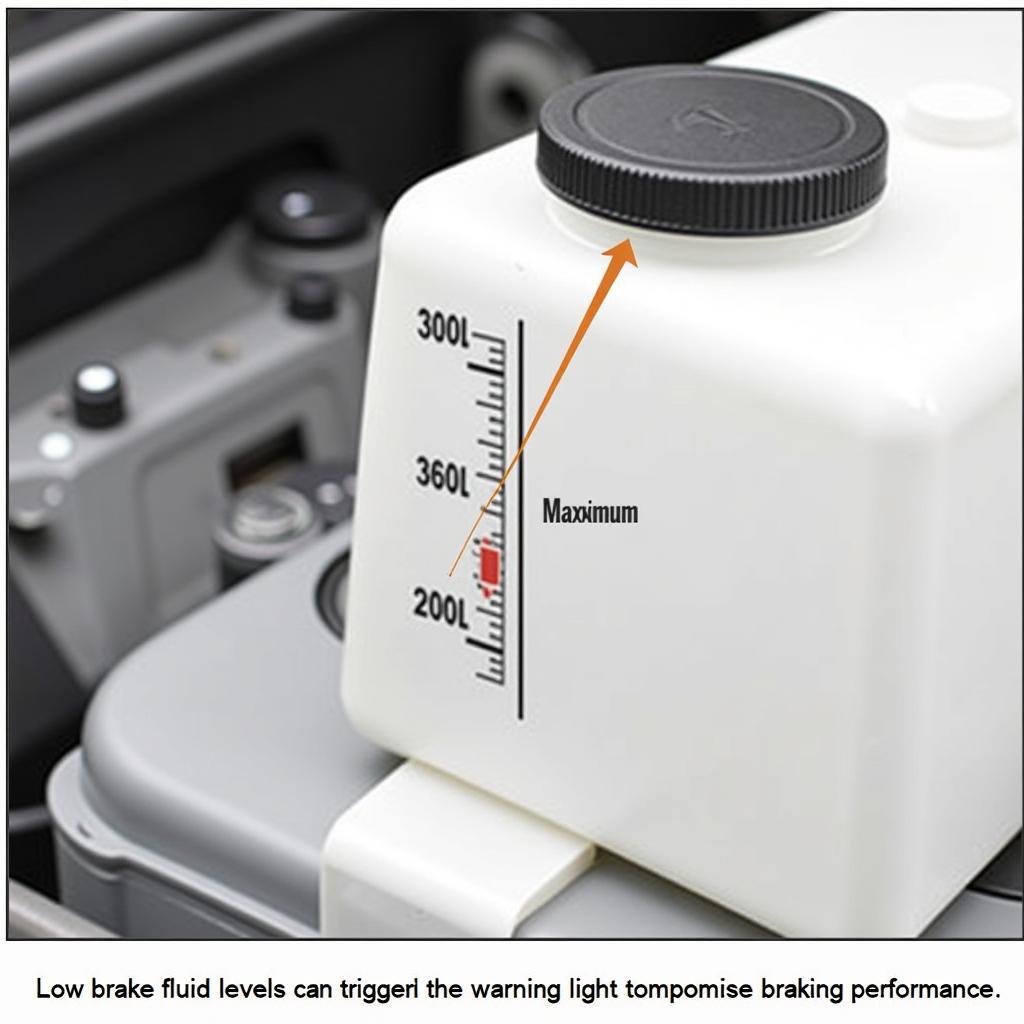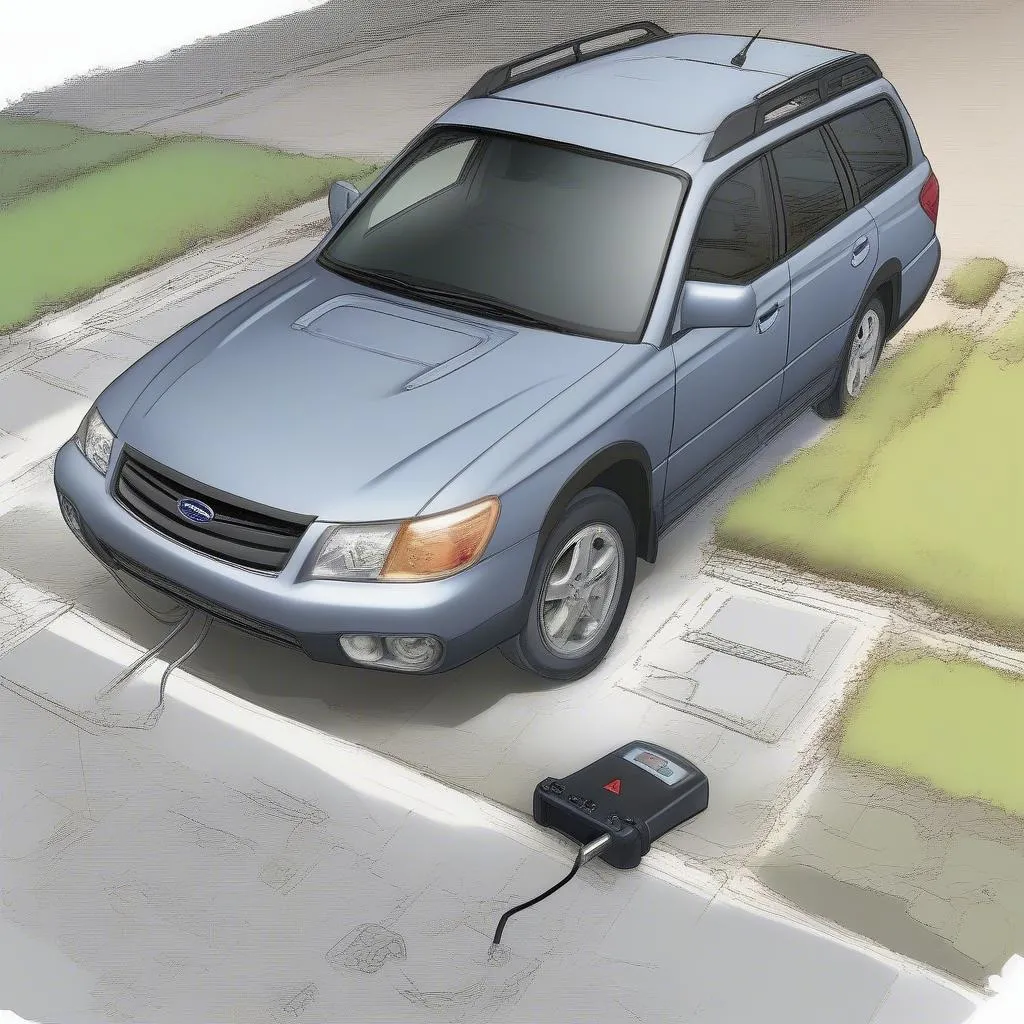The anti-lock brake system (ABS) is a crucial safety feature in your vehicle. When functioning correctly, it prevents your wheels from locking up during hard braking, allowing you to maintain steering control. So, when your anti-lock brake warning light illuminates on your dashboard and refuses to switch off, it’s a clear sign that something is amiss and requires your immediate attention. Ignoring this warning could compromise your safety and lead to costly repairs down the line.
This comprehensive guide will delve into the common causes of a persistent ABS warning light, walk you through potential solutions, and provide expert insights to help you navigate this automotive issue.
Understanding Your Car’s ABS System
Before we delve into the reasons your ABS light might be on, it’s helpful to understand the basics of how this system works. The ABS comprises several key components:
- Wheel Speed Sensors: These sensors, positioned at each wheel, continuously monitor the rotational speed.
- Electronic Control Unit (ECU): The brain of the system, the ECU processes data from the wheel speed sensors to detect any irregularities.
- Hydraulic Control Unit (HCU): Upon receiving signals from the ECU, the HCU modulates the brake fluid pressure to each wheel, preventing lock-ups.
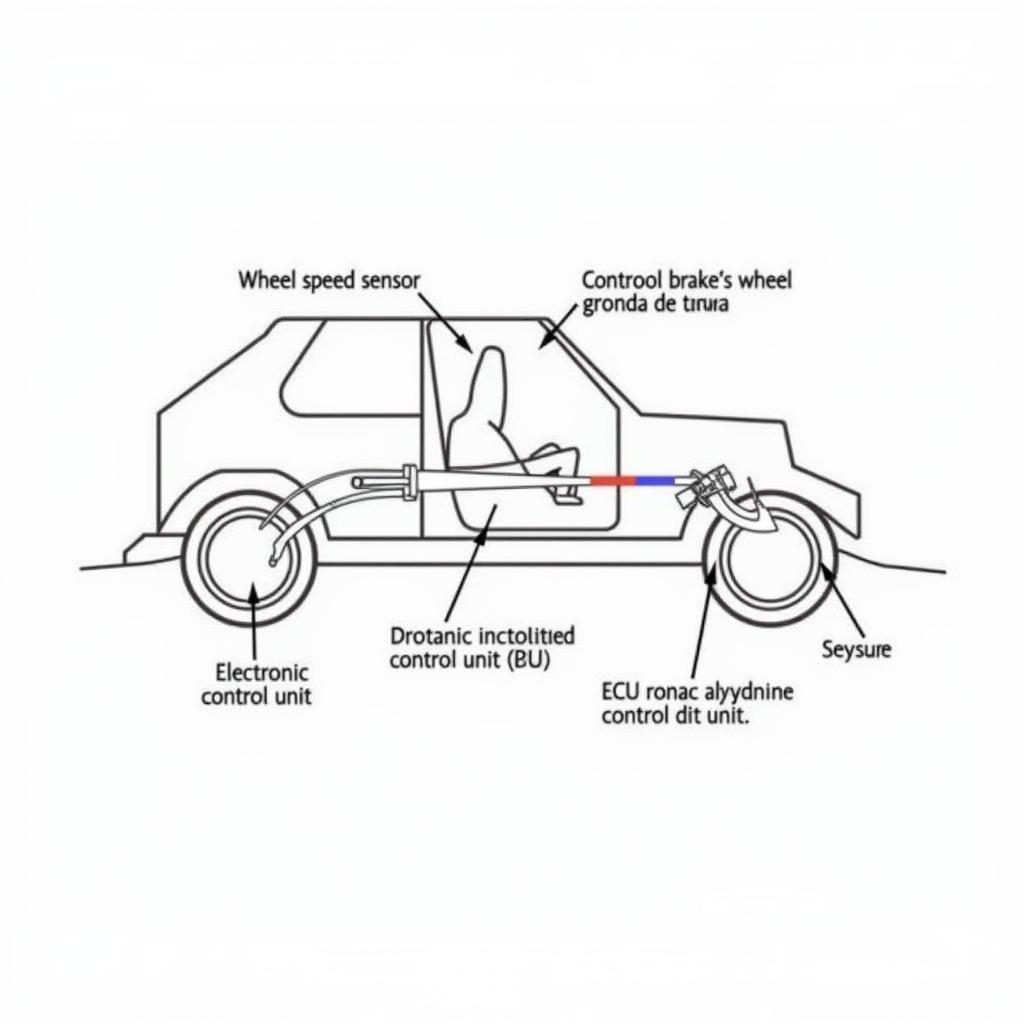 Car ABS System Components
Car ABS System Components
Common Causes of an Anti-Lock Brake Warning Light
A persistent ABS warning light signals a malfunction within the system, which could stem from several culprits:
- Faulty Wheel Speed Sensors: The most common culprit, a malfunctioning wheel speed sensor, can send inaccurate data to the ECU, triggering the warning light.
- Damaged ABS Sensor Wires: Exposure to road debris, corrosion, or general wear and tear can damage the wiring harness connecting the sensors to the ECU, disrupting communication.
- Low Brake Fluid Level: The ABS system relies on adequate brake fluid pressure. A low fluid level can trigger the warning light as it directly impacts the HCU’s ability to function correctly.
- Malfunctioning Hydraulic Control Unit (HCU): While less frequent, a faulty HCU can disrupt the system’s ability to modulate brake pressure effectively.
- Faulty ABS Control Module: In rare cases, the issue might originate from a malfunctioning ABS control module, requiring professional diagnosis and potential replacement.
What to Do When Your ABS Light Turns On
- Don’t Panic, But Don’t Ignore It: While a flashing ABS light doesn’t necessarily mean imminent danger, it’s crucial not to ignore it.
- Check Your Brake Fluid: Ensure the brake fluid reservoir is full. If low, carefully top it off with the recommended brake fluid type for your vehicle. Refer to your owner’s manual for guidance.
- Inspect for Visible Damage: Check for any visible damage to the ABS sensor wires, particularly near the wheels.
- Schedule a Professional Diagnosis: If the light remains illuminated after checking the brake fluid and inspecting for visible damage, it’s best to consult with a qualified mechanic specializing in automotive diagnostics, such as those at Car Diag Tech.
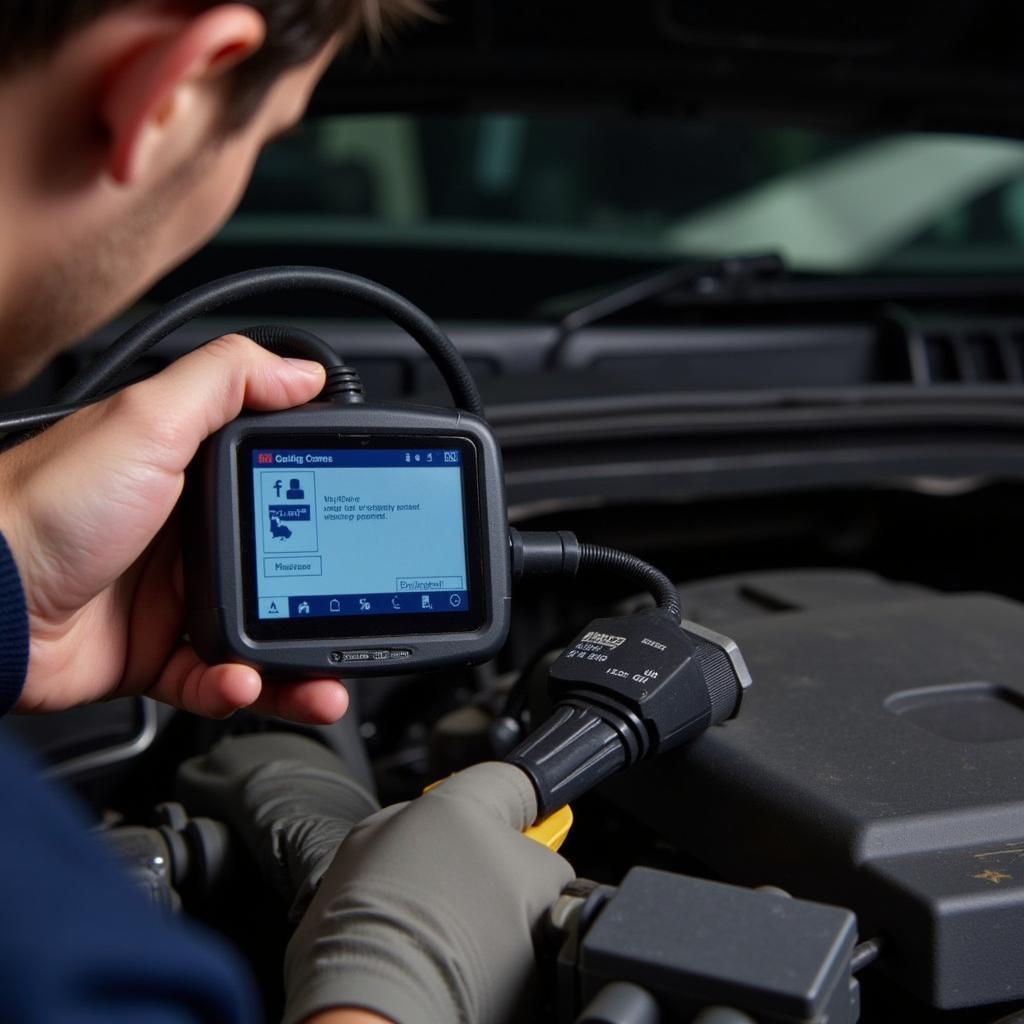 Mechanic Diagnosing ABS Issue Using Diagnostic Tool
Mechanic Diagnosing ABS Issue Using Diagnostic Tool
Remote Diagnostics and Programming: A Modern Solution
In today’s technologically advanced world, remote diagnostics and programming offer a convenient and efficient way to address ABS issues.
How it Works:
- Using specialized equipment, technicians can remotely access your vehicle’s computer system, often via the OBD-II port.
- They can retrieve diagnostic trouble codes (DTCs) to pinpoint the root cause of the ABS warning light.
- In some cases, they can remotely reprogram or update the ABS control module, eliminating the need for an in-person visit.
Benefits of Remote Diagnostics and Programming:
- Convenience: Receive expert diagnostics and potential solutions from the comfort of your home or office.
- Speed: Remote diagnostics can often be completed faster than traditional in-person appointments.
- Cost-Effective: In some instances, remote solutions can save you money on towing and labor costs associated with traditional repairs.
“Remote diagnostics and programming have revolutionized the way we approach car repairs,” says John Smith, Senior Automotive Diagnostic Technician at Car Diag Tech. “It allows us to quickly and accurately diagnose issues, often resolving them remotely and saving car owners valuable time and money.”
Preventing Future ABS Issues
- Regular Brake System Inspections: Schedule routine brake system checks with your trusted mechanic to catch potential issues early.
- Quality Brake Fluid: Use high-quality brake fluid and follow the manufacturer’s recommended replacement intervals.
- Careful Driving: Avoid harsh braking whenever possible to reduce strain on your ABS system.
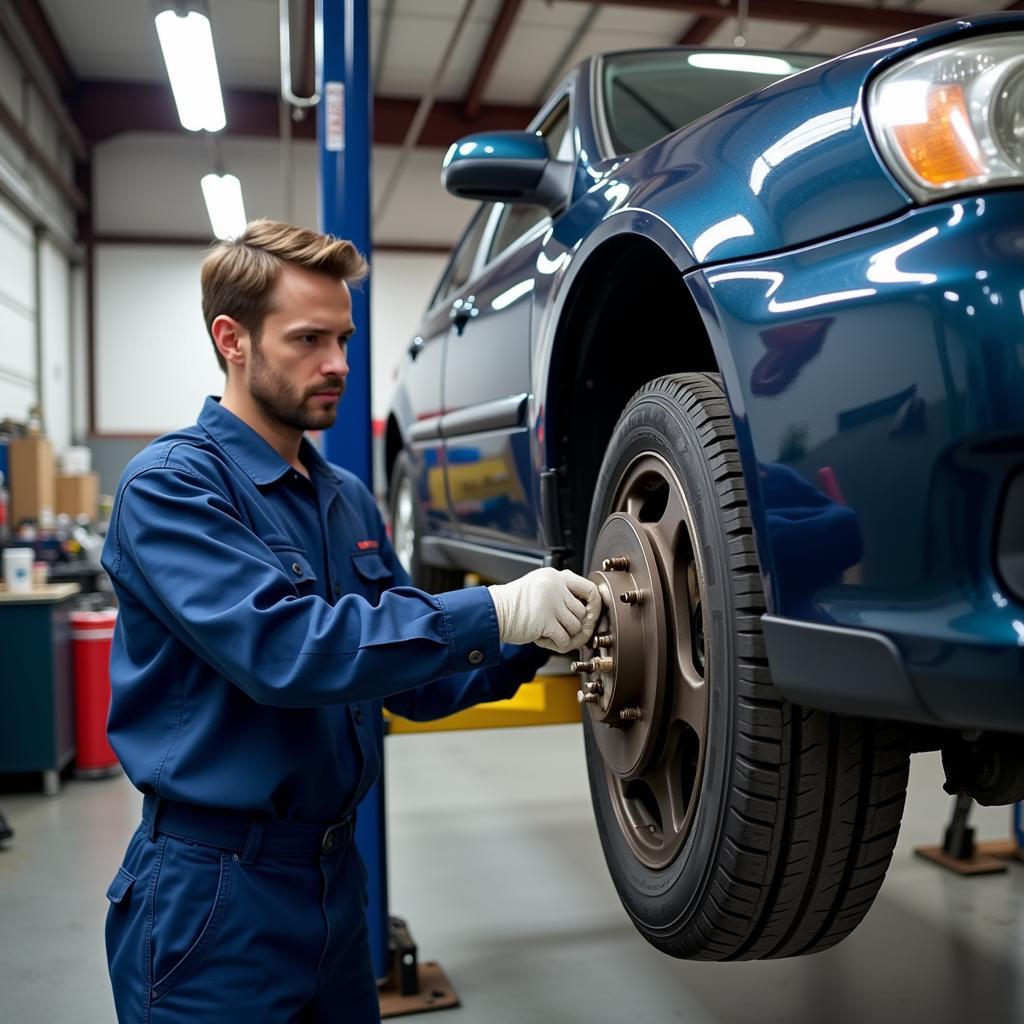 Car Undergoing Brake Inspection on a Lift
Car Undergoing Brake Inspection on a Lift
By understanding the intricacies of your vehicle’s ABS system, recognizing the warning signs, and taking proactive steps, you can ensure this crucial safety feature remains in optimal condition, keeping you safe on the road. If you’re experiencing issues with your ABS warning light, don’t hesitate to seek professional assistance from experienced technicians specializing in automotive diagnostics and repair. They have the expertise, tools, and knowledge to diagnose and address the problem accurately, ensuring your vehicle’s safety and reliability.
Frequently Asked Questions (FAQs)
1. Can I still drive my car if the ABS light is on?
While you can still drive, it’s not recommended. Your regular brakes should function, but the ABS system will be deactivated, increasing the risk of wheel lock-up during hard braking.
2. Is it expensive to fix an ABS problem?
The cost can vary widely depending on the root cause. A faulty sensor might be relatively inexpensive to replace, while a malfunctioning HCU or ABS module could be more costly.
3. How long does it take to diagnose an ABS problem?
Diagnosis can take anywhere from a quick visual inspection to more involved diagnostic testing with specialized equipment.
4. Can I check the ABS system myself?
While you can check your brake fluid level, it’s best to leave the diagnosis and repair of ABS system components to qualified professionals. They possess the expertise and tools to ensure accurate diagnosis and repair.
5. How often should I have my ABS system checked?
It’s a good practice to have your brake system, including the ABS, inspected annually or as recommended in your vehicle’s owner’s manual.

